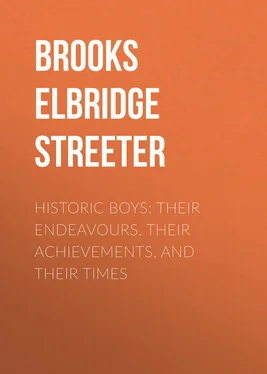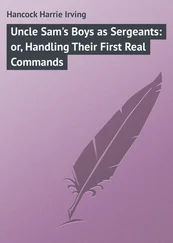Elbridge Brooks - Historic Boys - Their Endeavours, Their Achievements, and Their Times
Здесь есть возможность читать онлайн «Elbridge Brooks - Historic Boys - Their Endeavours, Their Achievements, and Their Times» — ознакомительный отрывок электронной книги совершенно бесплатно, а после прочтения отрывка купить полную версию. В некоторых случаях можно слушать аудио, скачать через торрент в формате fb2 и присутствует краткое содержание. ISBN: , Жанр: foreign_antique, foreign_prose, Биографии и Мемуары, на английском языке. Описание произведения, (предисловие) а так же отзывы посетителей доступны на портале библиотеки ЛибКат.
- Название:Historic Boys: Their Endeavours, Their Achievements, and Their Times
- Автор:
- Жанр:
- Год:неизвестен
- ISBN:http://www.gutenberg.org/ebooks/27157
- Рейтинг книги:3 / 5. Голосов: 1
-
Избранное:Добавить в избранное
- Отзывы:
-
Ваша оценка:
- 60
- 1
- 2
- 3
- 4
- 5
Historic Boys: Their Endeavours, Their Achievements, and Their Times: краткое содержание, описание и аннотация
Предлагаем к чтению аннотацию, описание, краткое содержание или предисловие (зависит от того, что написал сам автор книги «Historic Boys: Their Endeavours, Their Achievements, and Their Times»). Если вы не нашли необходимую информацию о книге — напишите в комментариях, мы постараемся отыскать её.
Historic Boys: Their Endeavours, Their Achievements, and Their Times — читать онлайн ознакомительный отрывок
Ниже представлен текст книги, разбитый по страницам. Система сохранения места последней прочитанной страницы, позволяет с удобством читать онлайн бесплатно книгу «Historic Boys: Their Endeavours, Their Achievements, and Their Times», без необходимости каждый раз заново искать на чём Вы остановились. Поставьте закладку, и сможете в любой момент перейти на страницу, на которой закончили чтение.
Интервал:
Закладка:
Then Marcus knew that the decree of the dying Emperor Hadrian had been confirmed, and that he, Marcus Annius Verus, the descendant of the ancient kings, the boy philosopher, the unassuming son of a noble mother, had been adopted as the son and successor of his uncle Antoninus, who was to reign after Hadrian's death, and that where he went, through the Forum and up the Sacred Street, there rode the heir to the greatest throne in the world, the future Emperor of Rome.
A Stoic still, unmoved, save for the slight flush that tinged his cheek as he acknowledged the greeting of the happy people, he passed on to his mother's house, and, in that dear home, amid the green gardens of the Cœlian Hill, he heard her lips speak her congratulations, and bent his head to receive her kiss of blessing.
"I lose a son, but gain an emperor," she said.
"No, my mother," the boy replied, proudly, "me thou shalt never lose. For, though I leave this dear home for the palace of the Cæsars, my heart is still here with that noble mother from whom I learned lessons of piety and benevolence and simplicity of life, and abstinence from evil deeds and evil thoughts."
Before five months had passed the great Emperor Hadrian died at Baiæ, in his hill-shaded palace by the sea, and the wise, country-loving uncle of Marcus succeeded to the throne as the Emperor Antoninus Pius. During all his glorious reign of twenty-three years, he had no more devoted admirer, subject, helper, and friend, than his adopted son and acknowledged successor, Marcus, who, in the year A. D. 161, ascended the throne of the Cæsars as the great Emperor Marcus Aurelius Antoninus.
The life of this Roman Marcus was one of unsought honors and titles. At six, a knight of the Equestrian Order; at eight, one of the priests of Mars; at twelve, a rigid Stoic; at sixteen, a magistrate of the city; at seventeen, a quæstor, or revenue officer; at nineteen, a consul and Cæsar; at forty, an emperor, – he was always clear-headed and clean-hearted, beloved by his people and honored by all, making this one rule the guide of all his actions: "Every moment think steadily as a Roman and a man, to do what thou hast in hand with perfect and simple dignity, with affection and freedom and justice."
A noble boy; a noble man; preserving, as has been said of him, "in a time of universal corruption, a nature sweet, pure, self-denying, and unaffected," – he teaches us all, boys and men alike, a lesson of real manliness. Here are two of his precepts, which we are none of us too young to remember, none of us too old to forget: "The best way of avenging thyself is not to become like the wrong-doer"; "Let me offer to the gods the best that is in me; so shall I be a strong man, ripened by age, a friend of the public good, a Roman, an emperor, a soldier at his post awaiting the signal of his trumpet, a man ready to quit life without a fear." The foremost boy of his time, manly, modest, princely, brave, and true, we can surely find no more fitting representative with which to open this series of "Historic Boys" than the boy magistrate, Marcus of Rome, the greatest and best of the Antonines.
II
BRIAN OF MUNSTER: THE BOY CHIEFTAIN
Into that picturesque and legend-filled section of Ireland now known as the County Clare, where over rocks and boulders the Shannon, "noblest of Irish rivers," rushes down past Killaloe and Castle Connell to Limerick and the sea, there rode one fair summer morning, many, many years ago, a young Irish lad. The skirt of his parti-colored lenn , or kilt, was richly embroidered and fringed with gold; his inar , or jacket, close-fitting and silver-trimmed, was open at the throat, displaying the embroidered lenn and the torc , or twisted collar of gold about his sturdy neck, while a purple scarf, held the jacket at the waist. A gleaming, golden brooch secured the long plaid brat , or shawl, that dropped from his left shoulder; broad bracelets encircled his bare and curiously tattooed arms, and from an odd-looking golden spiral at the back of his head his thick and dark-red hair fell in flowing ringlets upon his broad shoulders. Raw-hide shoes covered his feet, and his bronze shield and short war-ax hung conveniently from his saddle of skins. A strong guard of pikemen and gallowglasses, or heavy-armed footmen, followed at his pony's heels, and seemed an escort worthy a king's son.
A strong-limbed, cleanly-built lad of fifteen was this sturdy young horseman, who now rode down to the Ath na Borumma, or Ford of the Tribute, just above the rapids of the Shannon, near the town of Killaloe. And as he reined in his pony, he turned and bade his herald, Cogoran, sound the trumpet-blast that should announce to the Clan of Cas the return, from his years of fosterage, of the young flaith , or chieftain, Brian, the son of Kennedy, King of Thomond.
But ere the strong-lunged Cogoran could wind his horn, the hearts of all the company grew numb with fear as across the water the low, clear strains of a warning-song sounded from the haunted gray-stone, – the mystic rock of Carrick-lee, that overhung the tumbling rapids:
"Never yet for fear of foe,
By the ford of Killaloe,
Stooped the crests of heroes free —
Sons of Cas by Carrick-lee.
"Falls the arm that smites the foe,
By the ford of Killaloe;
Chilled the heart that boundeth free,
By the rock of Carrick-lee.
"He who knows not fear of foe,
Fears the ford of Killaloe;
Fears the voice that chants his dree,
From the rock of Carrick-lee."
Young Brian was full of the superstition of his day – superstition that even yet lives amid the simple peasantry of Ireland, and peoples rocks, and woods, and streams with good and evil spirits, fairies, sprites, and banshees; and no real, native Irish lad could fail to tremble before the mysterious song. Sorely troubled, he turned to Cogoran inquiringly, and that faithful retainer said in a rather shaky voice:
"'T is your warning-song, O noble young chief! 't is the voice of the banshee of our clan — A-oib-hinn , the wraith of Carrick-lee."
Just then from behind the haunted gray-rock a fair young girl appeared, tripping lightly across the large stepping-stones that furnished the only means of crossing the ford of Killaloe.
"See – see!" said Cogoran, grasping his young lord's arm; "she comes for thee. 'T is thy doom, O Master – the fiend of Carrick-lee!"
"So fair a fiend should bring me naught of grief," said young Brian, stoutly enough, though it must be confessed his heart beat fast and loud. "O Spirit of the Waters!" he exclaimed; "O banshee of Clan Cas! why thus early in his life dost thou come to summon the son of Kennedy the King?"
The young girl turned startled eyes upon the group of armed and warlike men, and grasping the skirt of her white and purple lenn , turned as if to flee, – when Cogoran, with a loud laugh, cried out:
"Now, fool and double fool am I, – fit brother to Sitric the blind, the black King of Dublin! Why, 't is no banshee, O noble young chief, 't is but thy foster-sister, Eimer, the daughter of Conor, Eimer the golden-haired!"
"Nay, is it so? St. Senanus be praised!" said Brian, greatly relieved. "Cross to us, maiden; cross to us," he said. "Fear nothing; 't is but Brian, thy foster-brother, returning to his father's home."
The girl swiftly crossed the ford and bowed her golden head in a vassal's welcome to the young lord.
"Welcome home, O brother," she said. "Even now, my lord, thy father awaits the sound of thy horn as he sits in the great seat beneath his kingly shield. And I – "
Читать дальшеИнтервал:
Закладка:
Похожие книги на «Historic Boys: Their Endeavours, Their Achievements, and Their Times»
Представляем Вашему вниманию похожие книги на «Historic Boys: Their Endeavours, Their Achievements, and Their Times» списком для выбора. Мы отобрали схожую по названию и смыслу литературу в надежде предоставить читателям больше вариантов отыскать новые, интересные, ещё непрочитанные произведения.
Обсуждение, отзывы о книге «Historic Boys: Their Endeavours, Their Achievements, and Their Times» и просто собственные мнения читателей. Оставьте ваши комментарии, напишите, что Вы думаете о произведении, его смысле или главных героях. Укажите что конкретно понравилось, а что нет, и почему Вы так считаете.












